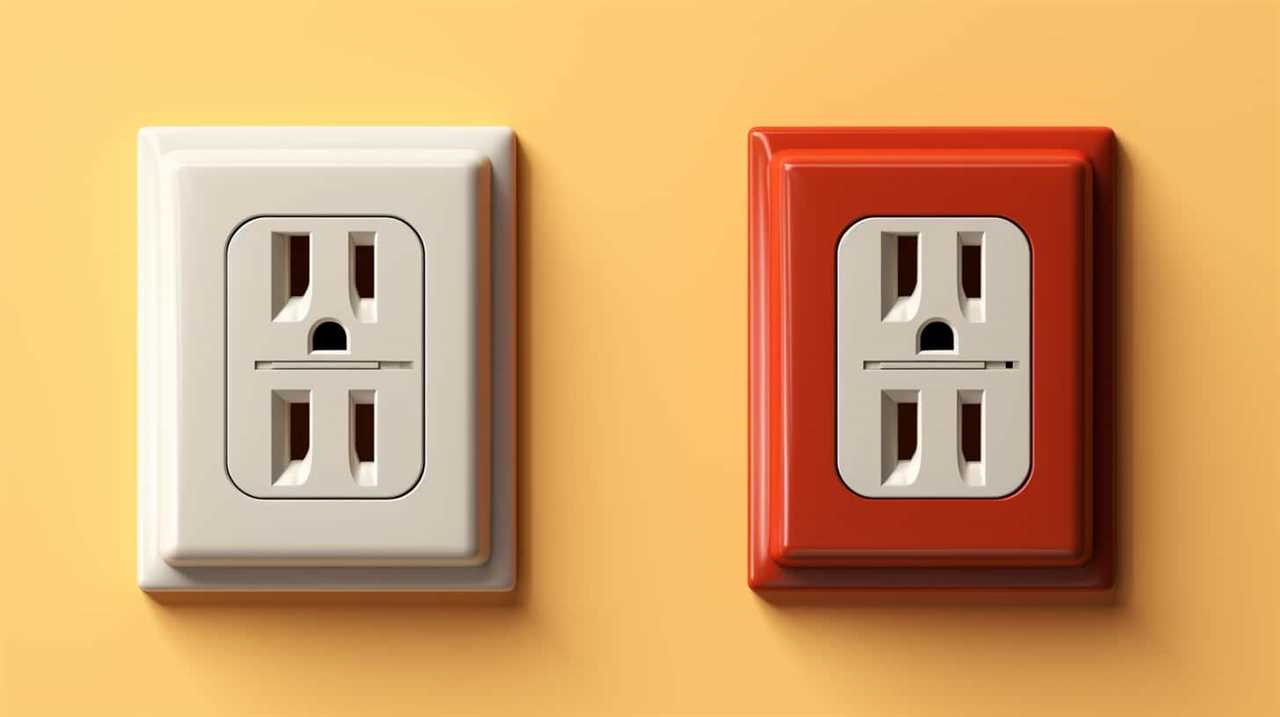Can small appliances be disposed of in the garbage as we tackle the challenges of responsible waste management?
In our quest for mastery over environmental impact, it is crucial to understand the potential hazards and local regulations surrounding the disposal of these appliances.
Through research-driven analysis, we aim to explore alternatives to simply throwing them away.
By examining recycling options and properly disposing of hazardous appliances, we can make informed decisions that benefit both our environment and our communities.

Key Takeaways
- Small appliances should not be thrown in the garbage due to the environmental impact and health risks associated with improper disposal.
- Small appliances can contain hazardous materials that can leach into the soil and water, posing significant risks to human health and the environment.
- Local regulations and guidelines for small appliance disposal should be followed to ensure safe handling and minimize environmental impact.
- Recycling, donation, and repair options are recommended for small appliances to reduce waste, minimize pollution, and extend their lifespan.
Environmental Impact of Small Appliance Disposal
When disposing of small appliances, it’s important to consider the environmental impact, as improper disposal can have detrimental effects on our planet. Many people often overlook the fact that small appliances can contain hazardous materials such as lead, mercury, and other toxic substances. These materials can leach into the soil and water, posing significant risks to human health and the environment.
One solution to mitigate these risks is to explore local disposal options. Many communities have designated recycling centers or collection events where residents can drop off their small appliances for proper recycling or disposal. By utilizing these local options, we can ensure that these appliances are handled in an environmentally responsible manner, reducing their impact on landfill waste and preventing the release of harmful substances into our ecosystems.
Local Regulations on Small Appliance Disposal
When it comes to the proper disposal of small appliances, it’s important to be aware of the recycling requirements in our local area. Different jurisdictions may have specific guidelines regarding the disposal of these items, and it’s crucial to adhere to these regulations to minimize environmental impact.
In addition to recycling, there are also proper disposal methods that need to be followed to ensure the safe handling of small appliances. Being knowledgeable about the local disposal guidelines can help us make informed decisions and contribute to a more sustainable environment.

Recycling Requirements for Appliances
Although small appliances can typically be disposed of in the garbage, it is important to be aware of the recycling requirements for appliances and the local regulations on small appliance disposal. Proper disposal and recycling of small appliances is crucial due to their environmental impact. Many small appliances contain hazardous materials such as lead, mercury, and cadmium, which can contaminate soil and water if not handled correctly. To ensure safe and responsible disposal, local regulations often require residents to recycle their small appliances. These regulations aim to reduce landfill waste, conserve resources, and protect the environment. By recycling small appliances, valuable materials can be recovered and reused, reducing the need for raw materials extraction and minimizing the overall carbon footprint. To understand the specific recycling requirements for appliances in your area, refer to the table below:
| City | Recycling Requirements for Appliances |
|---|---|
| New York | Must be taken to designated recycling centers |
| Los Angeles | Curbside pickup for small appliances |
| Chicago | Drop-off locations available for recycling |
| Houston | Appliances can be recycled at local transfer stations |
| Miami | Small appliances accepted at recycling events |
Proper Disposal Methods
We should follow the local regulations on small appliance disposal to ensure proper and responsible disposal methods. When it comes to disposing of small appliances, it’s important to consider the potential hazards they may pose to the environment and our health.
Here are three key steps to properly dispose of small appliances:
- Research local disposal facilities: Different areas have different regulations and resources for small appliance disposal. Look up local recycling centers or hazardous waste facilities that accept small appliances. These facilities are equipped to handle hazardous materials safely and can ensure that your small appliances are disposed of properly.
- Separate hazardous materials: Before disposing of small appliances, make sure to remove any hazardous materials they may contain. This includes batteries, mercury-containing bulbs, or any other potentially harmful components. These materials should be disposed of separately, following specific guidelines to prevent environmental contamination.
- Follow proper disposal methods for hazardous materials: Once you have separated the hazardous materials, ensure they’re disposed of correctly. Check with local authorities or disposal facilities for specific instructions on how to properly dispose of these materials. This will help prevent harm to the environment and ensure your small appliances are disposed of responsibly.
By following these steps, we can ensure that small appliances are disposed of in a way that’s safe for both our health and the environment.

Now, let’s explore the local disposal guidelines for small appliances.
Local Disposal Guidelines
To begin, let’s explore the regulations set by local authorities for the disposal of small appliances.
Local disposal methods vary depending on the specific regulations in your area. It’s important to adhere to these guidelines to ensure proper disposal and minimize potential health risks.
Many local authorities provide information on their official websites or through dedicated hotlines about the appropriate disposal methods for small appliances.

Some areas may have designated drop-off locations or recycling centers where you can safely dispose of these items.
These disposal methods are designed to prevent harmful materials from contaminating the environment and to promote recycling and reusing whenever possible.
Understanding the Potential Hazards
It’s important to be aware of the potential hazards when disposing of small appliances. Improper disposal can have significant environmental consequences and pose health risks. Here are three key hazards to consider:
- Environmental contamination: Small appliances often contain hazardous materials such as lead, mercury, or flame retardants. When disposed of in regular garbage, these substances can leach into the soil and water, polluting the environment and potentially harming wildlife.
- Health risks: Handling certain small appliances, especially those with sharp or exposed parts, can lead to injuries. Additionally, older appliances may release toxic fumes or emit electromagnetic radiation, posing health risks to both individuals and communities.
- Waste accumulation: Disposing of small appliances in the garbage contributes to the growing problem of waste accumulation in landfills. These appliances take up valuable space and can release harmful substances as they degrade over time.
Understanding these hazards highlights the importance of finding alternatives to throwing small appliances in the garbage.

Alternatives to Throwing Small Appliances in the Garbage
When it comes to small appliances, there are several alternatives to throwing them in the garbage.
One option is to explore recycling options available in your area, as many communities have designated drop-off locations or recycling programs specifically for electronic waste.
Additionally, consider donating your small appliances to organizations or charities that accept used items and can repurpose them for those in need.
Lastly, before tossing out a broken appliance, explore repair and reuse options, as there may be local repair shops or online platforms that offer repair services or connect you with individuals who can make use of your appliance.

Recycling Options Available
We have several recycling options available as alternatives to throwing small appliances in the garbage. Proper disposal of these appliances is important to prevent them from ending up in landfills where they can release harmful substances into the environment.
Here are three recycling options to consider:
- Local recycling programs: Many municipalities offer recycling programs specifically for small appliances. Check with your local government or waste management agency to see if they’ve designated drop-off locations or collection events for these items.
- Manufacturer take-back programs: Some appliance manufacturers have their own recycling programs in place. They may offer options for returning old appliances when purchasing new ones. Look for information on the manufacturer’s website or contact their customer service for more details.
- Electronics recycling facilities: Small appliances often contain electronic components that can be recycled. Electronics recycling facilities specialize in properly disposing of these items and extracting valuable materials for reuse. Search online for nearby facilities or contact your local recycling center for recommendations.
Donation Possibilities for Appliances
To continue our discussion on recycling options for small appliances, let’s explore the donation possibilities available as alternatives to throwing them in the garbage.
When it comes to donating small appliances, there are several options to consider. One option is to donate them to local charities or non-profit organizations that accept used appliances. These organizations often refurbish the appliances and provide them to individuals or families in need.

Another option is to sell the appliances online through platforms like Craigslist or Facebook Marketplace. This allows you to recoup some of the cost while giving someone else the opportunity to use the appliance.
By exploring these donation options and selling alternatives, we can ensure that small appliances continue to be used and valued, rather than ending up in the landfill.
With these options in mind, let’s now move on to discussing repair and reuse options for small appliances.
Repair and Reuse Options
Moving forward, let’s explore the various ways we can repair and reuse small appliances instead of simply discarding them in the garbage. When faced with a broken appliance, it’s important to consider repair options before resorting to disposal. Here are three alternatives to throwing small appliances in the garbage:

- Seek professional repair services: Many small appliances can be fixed by skilled technicians. Look for authorized repair centers or contact the manufacturer for assistance. Repairing a broken appliance not only saves it from ending up in a landfill but also extends its lifespan.
- DIY repair: If you have the necessary skills and knowledge, consider repairing the appliance yourself. There are online tutorials, forums, and instructional videos available that can guide you through the repair process.
- Repurpose or donate: If a small appliance is beyond repair, consider repurposing it for a different use. For example, a broken blender can be used as a storage container. Alternatively, you can donate the appliance to a local charity or community center where it may still be useful to someone else.
Recycling Options for Small Appliances
Small appliances can often be recycled instead of being thrown in the garbage. When it comes to recycling options for small appliances, there are a few possibilities to consider.
First, check with your local waste management facility or recycling center to see if they accept small appliances for recycling. Some municipalities offer curbside pickup for these items or have designated drop-off locations.
Another option is to donate gently used small appliances to local charities or thrift stores. Many organizations will gladly accept these items and either sell them to support their programs or distribute them to individuals in need.
It’s important to note that not all small appliances can be recycled, so it’s essential to check with the appropriate authorities or organizations to ensure that your appliance can be properly disposed of or recycled.

Donating Small Appliances to Charity
We can donate small appliances to charity as a way to give back and support those in need. Donating these items not only helps us declutter our homes but also contributes to a greater cause. Here are three donation options to consider:
- Local Charities: Many local charities accept small appliances as donations. These organizations often have community outreach programs that provide support to individuals and families in need. By donating to these charities, we can directly impact our community and help those who may not have the means to afford these items on their own.
- Thrift Stores: Thrift stores are another great option for donating small appliances. These stores often partner with charitable organizations and use the proceeds from the sale of donated items to fund their programs. By donating to thrift stores, we can contribute to the sustainability of these organizations and support their ongoing efforts.
- Online Platforms: There are online platforms that connect donors with individuals or families in need. These platforms provide a convenient way to donate small appliances directly to those who could benefit from them the most. By using these platforms, we can ensure that our donations go directly to those who need them, while also promoting sustainability and reducing waste.
Selling Small Appliances Online or at a Yard Sale
When it comes to selling small appliances, there are two main options: selling them online or organizing a yard sale.
Each method has its own advantages and considerations. Selling online allows for a wider audience and potentially higher prices, but it also requires more effort in terms of listing, shipping, and dealing with potential buyers.
On the other hand, a yard sale offers convenience and the opportunity to negotiate prices face-to-face, but it may attract fewer potential buyers.

Ultimately, the decision between online selling and a yard sale will depend on factors such as the type of appliances, their condition, and personal preferences.
Online Vs Yard Sale
Selling small appliances can be done online or at a yard sale, and there are advantages and disadvantages to both options. Here are three factors to consider:
- Online sales: Selling small appliances online provides a wider reach and access to a larger customer base. Platforms like eBay and Craigslist allow you to showcase your items to potential buyers across the country or even internationally. Additionally, online sales can result in higher prices due to the competitive nature of online marketplaces.
- Yard sale pricing: On the other hand, selling small appliances at a yard sale can be convenient and cost-effective. You can set your prices based on the condition of the appliance and local market rates. Yard sales also offer the opportunity for face-to-face negotiation, allowing you to potentially sell items at a higher price than initially listed.
Considering the advantages and disadvantages of both options, it’s important to carefully evaluate your goals, time constraints, and target audience when deciding between selling small appliances online or at a yard sale.
Moving on to pricing and negotiating…

Pricing and Negotiating
How can we determine the most effective pricing and negotiation strategies for selling small appliances online or at a yard sale?
When it comes to pricing options, it’s important to consider the condition, age, and demand for the appliance. Researching similar listings or completed sales on online platforms can provide valuable insights into the market value of the item. Additionally, conducting a yard sale allows for more flexibility in negotiating prices with potential buyers. It’s crucial to set a realistic price range and be open to bargaining. Offering package deals or discounts for multiple purchases can also attract more buyers. By adopting effective negotiation strategies, such as highlighting the features and benefits of the appliance or emphasizing its value compared to other options, sellers can increase their chances of closing a sale.
Transitioning into the next section, instead of disposing of small appliances, repairing them can be a cost-effective and sustainable alternative.
Repairing Small Appliances Instead of Disposing Them
Instead of throwing small appliances in the garbage, we should consider repairing them rather than disposing of them. Repairing small appliances can have several advantages over replacing them. Here are three reasons why repairing small appliances is a cost-effective and sustainable option:

- Cost considerations: Repairing a small appliance is often more affordable than buying a new one. Repair costs are typically lower than the cost of purchasing a brand new appliance, especially for high-quality appliances that are built to last.
- Environmental impact: By repairing small appliances instead of throwing them away, we can reduce the amount of electronic waste that ends up in landfills. This helps to preserve natural resources and minimize pollution associated with the production and disposal of new appliances.
- Retaining functionality: Repairing a small appliance allows us to retain its functionality and extend its lifespan. Many small appliances are designed to be repairable, and with proper maintenance and occasional repairs, they can continue to serve their purpose for many years.
Disposing of Small Appliances Through Electronic Waste Programs
Continuing our discussion on repairing small appliances, we can dispose of them through electronic waste programs. When it comes to getting rid of small appliances, it’s important to choose the right disposal option.
Electronic waste, or e-waste, management programs provide a solution for properly disposing of these items. These programs are designed to handle electronic devices and appliances in an environmentally friendly manner. By participating in e-waste programs, we can ensure that our small appliances are recycled and disposed of properly, minimizing their impact on the environment.
These programs often have drop-off locations or collection events where you can bring your small appliances for disposal. By utilizing these disposal options, we can contribute to the responsible management of e-waste.
With this in mind, let’s now delve into the proper disposal of hazardous small appliances.

Properly Disposing of Hazardous Small Appliances
To properly dispose of hazardous small appliances, there are several options available through e-waste management programs. It’s important to handle these appliances responsibly to protect the environment and our health.
- Local Collection Events: Many communities organize regular collection events where residents can drop off their hazardous small appliances. These events are typically held at designated locations and times, making it convenient for people to dispose of their appliances safely.
- Manufacturer Take-Back Programs: Some appliance manufacturers offer take-back programs for their products. These programs allow consumers to return their old appliances to the manufacturer, who will then ensure they are properly disposed of or recycled.
- Certified Recycling Facilities: Another option is to take your hazardous small appliances to certified recycling facilities. These facilities are equipped to handle and dispose of these items safely, ensuring that any hazardous materials are properly managed.
Benefits of Responsible Small Appliance Disposal
Responsible small appliance disposal offers numerous advantages for both our environment and our well-being. Recycling these appliances not only helps reduce electronic waste but also conserves valuable resources and prevents the release of harmful substances into the environment. By properly disposing of small appliances, we can contribute to a cleaner and healthier planet.
Here are some key benefits of recycling small appliances:
| Benefits of Recycling Small Appliances |
|---|
| Reduces electronic waste |
| Conserves valuable resources |
| Prevents release of harmful substances |
| Promotes a cleaner environment |
| Supports sustainable practices |
As we can see from the table above, responsible small appliance disposal has wide-ranging positive impacts. Recycling these appliances not only reduces the amount of electronic waste that ends up in landfills but also helps conserve valuable materials such as metal, plastic, and glass. Additionally, by preventing the release of harmful substances found in these appliances, we can protect our environment and promote a healthier ecosystem. Overall, responsible small appliance disposal is a crucial step towards reducing our environmental footprint and embracing sustainable practices.

Risks of Improper Small Appliance Disposal
Moving forward, we need to address the potential risks associated with improper disposal of small appliances. Improper disposal of small appliances can have serious risks and consequences for both the environment and human health. Here are three key risks to consider:
- Environmental Pollution:
Small appliances contain various hazardous materials such as lead, mercury, and flame retardants. When these appliances end up in landfills, these toxic substances can seep into the soil and groundwater, polluting the environment. - Health Hazards:
Improperly disposed small appliances can release harmful chemicals into the air, posing a risk to human health. Breathing in toxic fumes from these appliances can lead to respiratory problems, allergies, and even more serious health issues. - Fire Hazards:
Many small appliances contain flammable materials or have electrical components that can cause fires if not disposed of properly. This can put not only the environment at risk but also people’s homes and lives.
To mitigate these risks and consequences, it’s crucial to follow proper disposal methods for small appliances.
Conclusion: Making an Informed Decision About Small Appliance Disposal
When considering the risks associated with improper small appliance disposal, we must make an informed decision to ensure the safety of our environment and our health.
Fortunately, there are several disposal options and eco-friendly alternatives available to us.

One option is to donate the small appliances that are still in good working condition to charitable organizations or thrift stores. This not only extends the life of the appliance but also benefits those in need.
Another option is to recycle the appliances through designated recycling programs or facilities. Many cities and municipalities have electronic waste recycling centers that accept small appliances. These centers dismantle the appliances, separate the recyclable materials, and properly dispose of any hazardous components.
Frequently Asked Questions
Can Small Appliances Be Recycled if They Are Not in Working Condition?
Recycling options for small appliances in non-working condition depend on local regulations. Many municipalities offer special disposal methods, such as drop-off locations or curbside pick-up, to prevent them from going in the garbage.
Are There Any Local Programs That Offer Pick-Up Services for Small Appliance Disposal?
Local disposal options for small appliances can include pick-up services provided by recycling programs. Recycling these appliances instead of throwing them in the garbage has numerous benefits, such as reducing waste and conserving resources.

What Are the Potential Health Risks Associated With Improper Small Appliance Disposal?
Potential health risks associated with improper small appliance disposal include exposure to harmful chemicals, release of toxic fumes, and contamination of soil and water. To mitigate these risks, it is crucial to follow proper disposal methods recommended by local authorities.
Can Small Appliances Be Donated to Charity Even if They Are Not in Perfect Condition?
Donating damaged small appliances to charity, even if they’re not in perfect condition, can still benefit others. While some may argue that only brand new items should be donated, the truth is that many people can still find value in imperfect items.
Are There Any Financial Incentives for Properly Disposing of Small Appliances Through Electronic Waste Programs?
Financial benefits can be obtained by properly disposing of small appliances through electronic waste programs. These programs not only help reduce the environmental impact of improper disposal but also often offer incentives such as cash rewards or discounts on new appliances.
Conclusion
In conclusion, it’s crucial to make an informed decision about small appliance disposal. By understanding the environmental impact, local regulations, and potential hazards, we can take steps to responsibly dispose of these items.

Recycling options and proper disposal of hazardous appliances are available, ensuring a safer and more sustainable future. Remember, every small action counts in preserving our planet.
Let’s not throw away our appliances like they’re worthless, but rather treat them with care, for they hold the power to make a difference.









